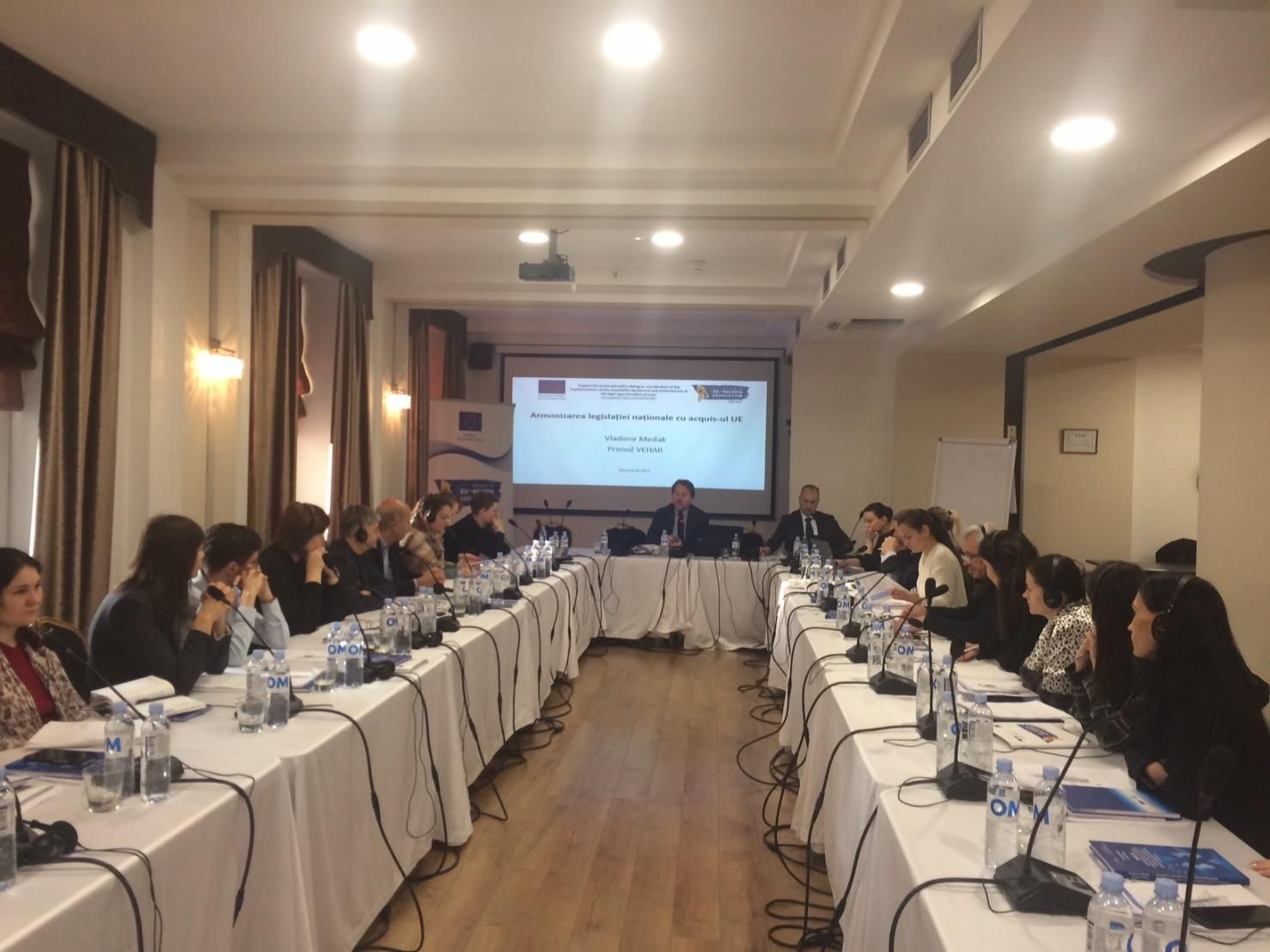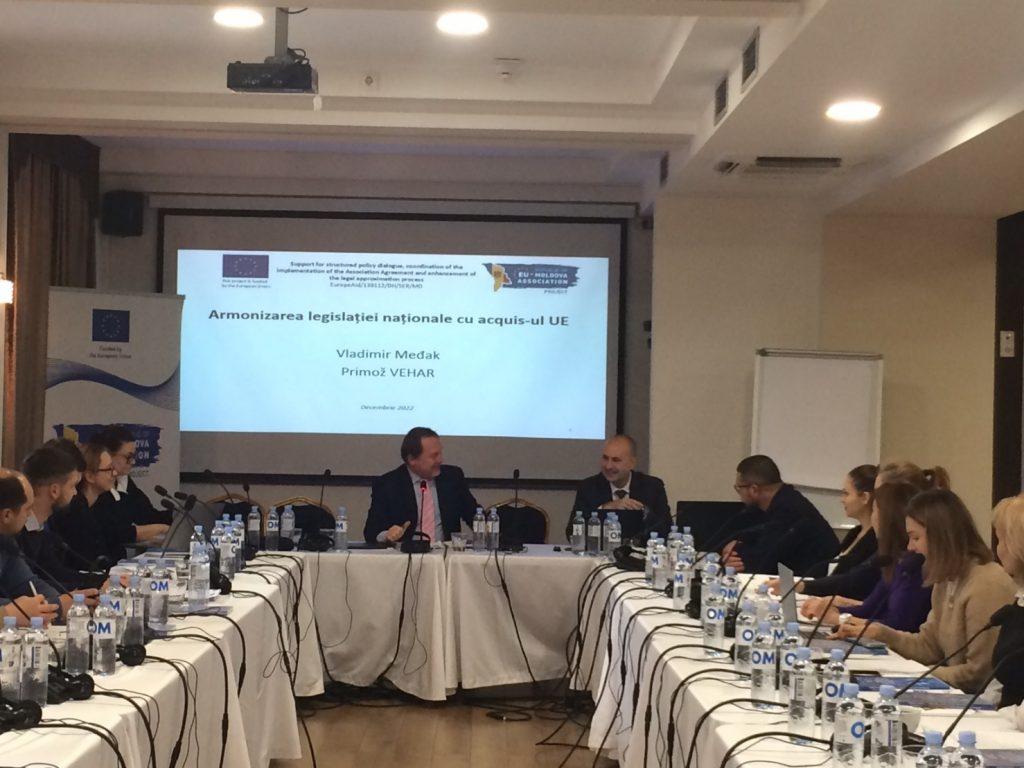
Armonizarea legislației naționale cu acquis-ul UE – sesiuni de lucru pentru funcționarii publici din Republica Moldova
Pe parcursul a două săptămâni a lunii decembrie 2022, proiectul finanțat de UE „Sprijin pentru dialog politic structurat, coordonarea implementării Acordului de Asociere și îmbunătățirea procesului de aproximare legală în Republica Moldova” a organizat la Chișinău patru mese rotunde privind aproximarea legală cu UE și viitorul proces de aderare a Republicii Moldova la UE pentru funcționarii publici care lucrează la procesul de armonizare în Guvernul Republicii Moldova. Mesele rotunde au fost organizate pe 6, 8, 13 și 14 decembrie 2022.
La aceste patru mese rotunde au participat aproximativ 140 de funcționari publici din instituții precum Ministerul Afacerilor Externe și Integrării Europene, Ministerul Justiției, Ministerul Afacerilor Interne, Ministerul Apărării, Ministerul Economiei, Ministerul Finanțelor, Ministerul Muncii și Protecției Sociale, Ministerul Agriculturii, Ministerul Sănătății, Ministerul Mediului, Ministerul Culturii, Ministerul Educației, Ministerul Infrastructurii și Dezvoltării Regionale, Agenția Națională pentru Siguranța Alimentelor, Biroul Național de Statistică, Centrul Național pentru Protecție a Datelor cu Caracter Personal, Consiliul Concurenței, Agenția de Stat pentru Proprietatea Intelectuală, Agenția Medicamentului și Dispozitivelor Medicale și serviciul public al Parlamentului.
Aproximarea legislației naționale cu acquis-ul UE este unul dintre subiectele de bază în negocierile privind aderarea la UE. După depunerea cererii de aderare a Moldovei la UE și ulterior, obținerea statutului de stat candidat la aderarea UE pe 23 iunie 2022, o astfel de armonizare a legislației Moldovei a devenit o prioritate majoră. Odată cu inițierea ulterioară a negocierilor de aderare, va spori suplimentar și importanța aproximării legală .
Consiliul European de la Copenhaga din 1993 a definit cel de-al treilea criteriu de aderare la UE ca fiind „capacitatea de a-și asuma obligațiile care decurg din calitatea de membru, inclusiv aderarea la obiectivele unificării politice, precum și la Uniunea Economică și Monetară (UEM)”. Un stat care dorește să adere la UE trebuie să-și armonizeze legislația națională cu acquis-ul comunitar în timpul negocierilor de aderare la UE. Acquis-ul UE, prin natura sa, nu face obiectul negocierilor de aderare la UE, deoarece statul trebuie să pună în aplicare întregul acquis comunitar. Țara negociază, în schimb, „cum” și „când” va pune în aplicare întregul acquis comunitar în sistemul său juridic.
Această abordare a fost aplicată începând cu anul 1973 și începând cu primul val de extindere a Comunității Economice Europene (care a devenit ulterior Uniunea Europeană). Începând cu data aderării, acquis-ul UE va fi aplicat pe teritoriul unui nou stat membru al UE în același mod în care este aplicat pe teritoriul tuturor celorlalte state membre ale UE. Singurele derogări de la această regulă sunt eventualele dispoziții tranzitorii care pot fi convenite în mod excepțional în timpul negocierilor de aderare. Aceste excepții sunt negociate ținând cont de situația specifică a unei țări candidate și îi permit acesteia să nu pună în aplicare integral anumite acte ale UE (definite în mod specific) pe teritoriul său pentru o perioadă limitată după aderare sau să le pună în aplicare într-un mod specific. Aceste excepții sunt foarte limitate în timp și în domeniul de aplicare.

Principalele subiecte discutate în cadrul mesei rotunde au fost: i) legislația UE și sursele obligației de armonizare pentru Moldova; ii) reguli și principii generale de armonizare a legislației cu acquis-ul UE; iii) aproximarea legală în Republica Moldova; iv) informații de bază privind etapele negocierilor de aderare și Programul național de adoptare a acquis-ului; v) rolul Parlamentului în procesul de aderare la UE.
Discuțiile au fost moderate de către dl Primož Vehar, Liderul echipei de proiect și fost oficial înalt din cadrul Oficiului Legislativ al Guvernului Sloveniei, responsabil de procesul de aproximare legală, iar ulterior și Șef al Secretariatului Comisiei Parlamentare pentru Afaceri Europene, și dl Vladimir Medjak, fost director adjunct al Serviciului Guvernamental pentru Integrare Europeană din Serbia (responsabil pentru armonizarea legislației și implementarea AA) și fost jurist-șef al echipei de negociere a aderării Serbiei. Reprezentanții Centrului de Armonizare a Legislației al Guvernului Moldovei au avut un rol activ în timpul tuturor meselor rotunde și au dat explicații privind procesul de aproximare în Moldova.
Experții au explicat scopul legislației UE, sursele în materie de drept UE, tipurile de acte juridice ale UE, evoluția legislației UE, etapele procesului de armonizare, tipurile și nivelurile de aproximare, metodele și tehnicile de transpunere a legislației UE în legislația națională, sfaturi practice ce trebuie și nu trebuie să fie făcut în acest proces, au explicat detalii privind pașii și cerințele în procesul de aproximare în Moldova. Experții au oferit informații de bază despre procesul de aderare și importanța armonizării legislației în cadrul procesului. Aceștia au acordat o atenție deosebită rolului parlamentului național în procesul de aproximare legală în procesul negocierilor de aderare la UE.
Toți participanții au primit „Manual privind armonizarea legislației ca element cheie pentru succesul procesului de integrare a Republicii Moldova în Uniunea Europeană”, scris de ambii vorbitori în strânsă colaborare cu experții Centrului de Armonizare a Legislației. Manualul care, printre altele, conține și multe exemple practice și indicii de aproximare legală, precum și prezintă procesul de negocieri de aderare, va fi prezentat public pe 12 ianuarie 2023 în spațiul Europe Café din Chișinău.
Proiectul finanțat de UE „Sprijin pentru dialog politic structurat, coordonarea implementării Acordului de Asociere și îmbunătățirea procesului de aproximare legală în Republica Moldova” are drept scop sporirea capacităților Guvernului Republicii Moldova și a altor instituții cheie de nivel național în implementarea Acordului de Asociere UE-Republica Moldova.


